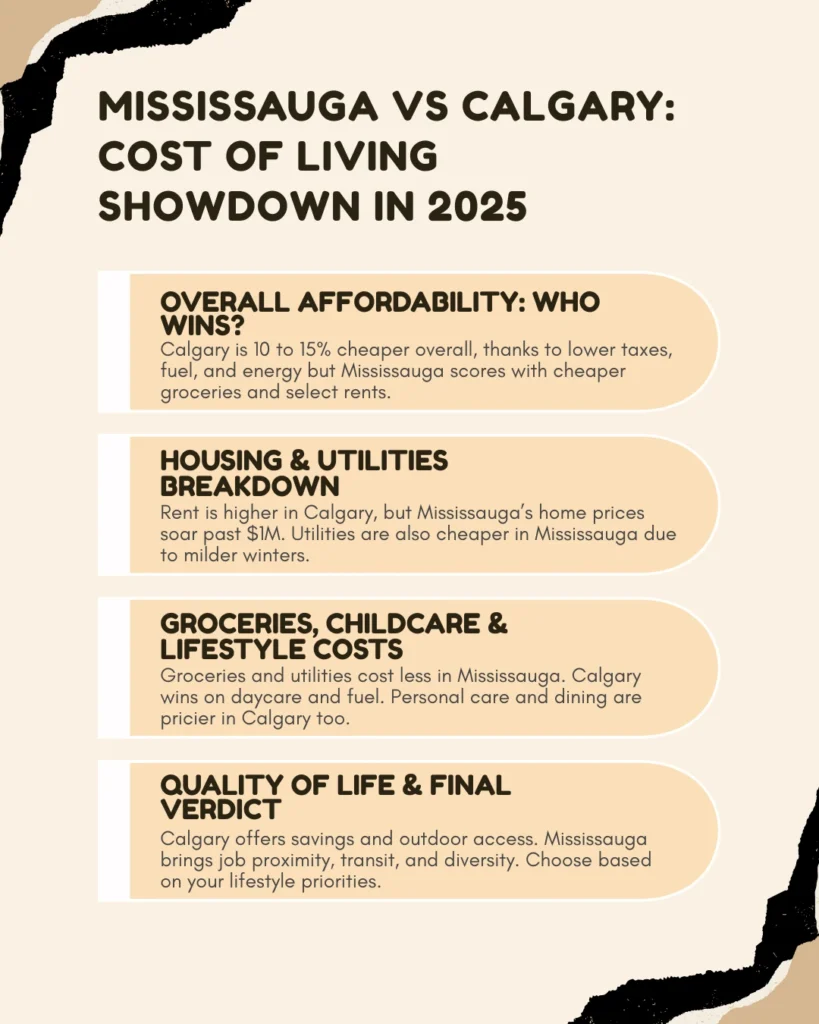Calgary vs Mississauga Cost of Living Comparison


Table of Contents
ToggleWhen deciding where to live in Canada, two cities often come up in conversations: Calgary and Mississauga. Both offer strong job markets, vibrant communities, and a good quality of life, but the cost to live in each is quite different. Understanding the Mississauga Cost of Living compared to Calgary is important whether you are moving for work, school, or lifestyle reasons.
In this detailed guide, we will compare expenses in housing, food, transportation, utilities, childcare, and other daily costs. We will also consider how quality of life ties into affordability. By the end, you will have a clear picture of which city may suit your budget and lifestyle better.
Looking at overall living costs, Calgary is often considered cheaper than Mississauga. The gap is around 10 to 15% depending on your spending habits. Calgary benefits from lower taxes, cheaper fuel, and affordable childcare. However, the Mississauga Cost of Living has its advantages, especially when it comes to groceries, rent in some neighbourhoods, and utility bills.
For a single person, monthly expenses (excluding rent) in Mississauga cost of living typically range between $1,300 and $1,500, while in Calgary they hover around $1,200 to $1,400. Families naturally spend more, and the difference in costs becomes more noticeable when childcare or housing comes into play.
Housing is the most significant factor in the Mississauga Cost of Living. Rent for a two bedroom apartment in a regular area of Mississauga cost of living is usually around $2,300 per month. In Calgary, a similar apartment averages $2,600. For larger homes, Calgary prices rise even more, especially in high demand areas.
Buying property tells another story. The average detached home price in Mississauga cost of living exceeds $1 million, a figure that continues to climb due to limited supply and proximity to Toronto. In contrast, Calgary’s detached homes average around $650,000 to $700,000. This makes homeownership far more affordable in Calgary.
Utilities also affect monthly housing costs. Mississauga cost of living residents usually pay around $200 for electricity, water, and heating, while in Calgary, these bills often exceed $300. This difference is partly due to Calgary’s colder winters and higher heating demand.
Transportation is where Calgary typically has an edge. Gas prices are lower in Alberta because of local production and lower taxes. Mississauga cost of living drivers pay significantly more at the pump, and these costs add up quickly for commuters.
Public transit, however, is slightly cheaper in Calgary. Monthly passes cost less, making it attractive for those who rely on buses and trains. Car insurance rates can be high in both cities, but they vary depending on driving history and vehicle type.
Parking fees are another consideration. In downtown Mississauga cost of living, parking is expensive due to high demand and limited space. Calgary also charges for parking in central areas, but prices are often lower.
Groceries are a pleasant surprise for those considering Mississauga. The Mississauga Cost of Living benefits from cheaper grocery prices compared to Calgary. Essentials like milk, chicken, and produce often cost less in Mississauga. For families that cook at home, this difference translates into noticeable monthly savings.
Eating out, however, shows mixed results. Casual dining and fast food prices are similar in both cities. Sit down restaurants tend to cost slightly more in Calgary, particularly in trendy neighbourhoods. People who dine out frequently may find Mississauga cost of living easier on the wallet in this category.
Canada’s healthcare system covers most major medical expenses, but private costs such as dental visits, prescription drugs, and specialist appointments still matter. Here, Mississauga has a slight advantage. Out of pocket expenses tend to be lower, and the availability of clinics and specialists helps keep costs competitive.
Insurance premiums vary significantly between individuals, but many residents find Calgary slightly more expensive for private plans. This difference is not huge, but it does contribute to the total cost picture.
Childcare is another factor where costs diverge. Calgary offers slightly cheaper daycare fees compared to Mississauga, but the difference is not overwhelming. Ontario’s subsidies help families offset high childcare costs, making the Mississauga Cost of Living more manageable for parents.
Private school tuition is generally higher in Calgary, while public schools in both cities maintain good standards. For families with young children, these differences can influence long term budgeting.
Lifestyle choices also shape your cost of living. Gym memberships, entertainment, and personal care services often cost more in Calgary than in Mississauga. For example, monthly gym fees can be 30 to 40% higher in Calgary, and haircuts or spa treatments also tend to cost more.
Internet and phone bills are slightly lower in Mississauga cost of living, resulting in a small but consistent monthly saving. Clothing costs are similar across both cities since brand pricing does not vary much.
Cost is important, but so is quality of life. Calgary consistently ranks as one of Canada’s most livable cities, offering high wages, low unemployment, and stunning access to outdoor activities. Lower overall expenses mean many residents enjoy a good balance between income and lifestyle.
Mississauga, on the other hand, offers proximity to Toronto’s job market, cultural diversity, and a strong sense of community. The city is modernising rapidly with new developments, parks, and transit improvements. For those seeking big city opportunities without living directly in Toronto, Mississauga is appealing, despite its higher housing prices.
After looking at all factors, Calgary is generally more affordable overall because of lower transportation, energy costs, and childcare. However, the Mississauga Cost of Living is not drastically higher and can even be lower in areas like rent for certain apartments, utilities, groceries, and some personal expenses.
For young professionals and families who value proximity to Toronto and access to urban amenities, Mississauga cost of living may still be worth the extra cost. For those who prefer lower taxes, cheaper fuel, and more affordable homeownership, Calgary remains a strong choice.
Both cities offer an excellent quality of life, but they cater to different needs. Calgary provides savings on fuel, childcare, and energy while delivering higher disposable income for many residents. Mississauga offers advantages in groceries, some rental prices, and lower utilities, making the Mississauga Cost of Living surprisingly competitive.
Ultimately, choosing between the two depends on your priorities. If you prioritise housing affordability and maximising savings, Calgary could be the winner. However, if you are looking for a city with strong connectivity, lower grocery bills, and diverse opportunities, Mississauga is an excellent option.